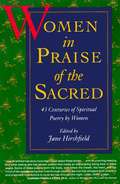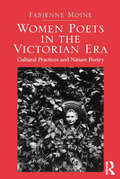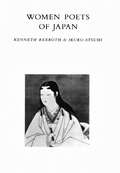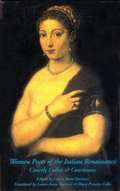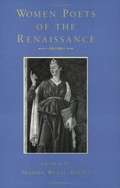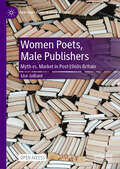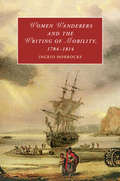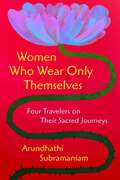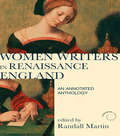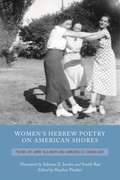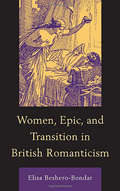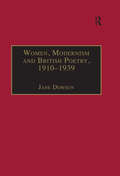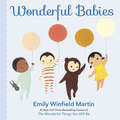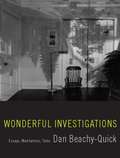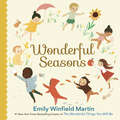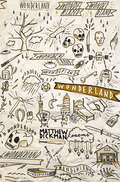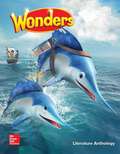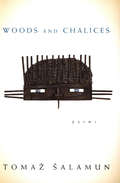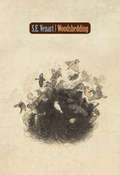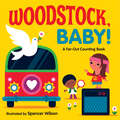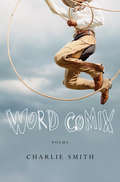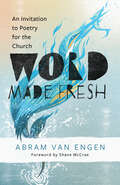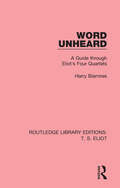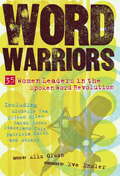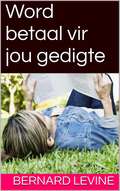- Table View
- List View
Women In Praise Of The Sacred: 43 Centuries Of Spiritual Poetry By Women
by Jane Hirshfield Hirshfield"Hirshfield's current collection brings together . . . an astonishing array of women writers from the 22nd century BC poet Enheduanna to Nelly Sachs and Anna Akhmatova. "--Library Journal
Women Poets in the Victorian Era: Cultural Practices and Nature Poetry
by Fabienne MoineExamining the place of nature in Victorian women's poetry, Fabienne Moine explores the work of canonical and long-neglected women poets to show the myriad connections between women and nature during the period. At the same time, she challenges essentialist discourses that assume innate affinities between women and the natural world. Rather, Moine shows, Victorian women poets mobilised these alliances to defend common interests and express their engagement with social issues. While well-known poets such as Elizabeth Barrett Browning and Christina Rossetti are well-represented in Moine's study, she pays particular attention to lesser known writers such as Mary Howitt or Eliza Cook who were popular during their lifetimes or Edith Nesbit, whose verse has received scant critical attention so far. She also brings to the fore the poetry of many non-professional poets. Looking to their immediate cultural environments for inspiration, these women reconstructed the natural world in poems that raise questions about the validity and the scope of representations of nature, ultimately questioning or undermining social practices that mould and often fossilise cultural identities.
Women Poets of Japan
by Kenneth Rexroth Ikuko AtsumiFrom early as the seventh century up to the present day, no other has had so many important women poets as Japan. In this collection (originally published by The Seabury Press in 1977 as The Burning Heart, Kenneth Rexroth and Ikuko Atsumi have assembled representative works of seventy-seven poets. Staring with the Classical Period (645-1604 A.D.), characterized by the wanka and tanka styles,followed by haiku poets of the Tokugawa period (to 1867), the subsequent modern tanka and haiku poets,and including the contemporary school of free verse--Women Poets of Japan records twelve hundred years of poetic accomplishment. Included are biographical notes on the individual poets, an essay on Japanese women and literature, and a table of historical periods.
Women Poets of the Italian Renaissance: Courtly Ladies and Courtesans
by Laura Anna Stortoni Mary Prentice LillieThis dual-language collection presents the rich flowering of women's poetry during the Italian Renaissance: from the love lyrics of famous courtly ladies of Venice and Rome to the deeply moral and spiritual poets of the age. It includes biographies of 19 poets and over 80 selected poems in the original Italian with facing English verse translation. Poets include: Laura Battiferri Ammannati, Isabella Andreini, Vittoria Colonna, Tullia d'Aragona, Lucia Bertani Dell'Oro, Leonora Ravira Falletti, Moderata Fonte, Veronica Franco, Veronica Gàmbara, Olimpia Malipiera, Chiara Matraini, Lucrezia Tornabuoni de' Medici, Isabella di Morra, Aurelia Petrucci, Antonia Giannotti Pulci, Camilla Scarampa, Gaspara Stampa, Laura Bacio Terracina, Barbara Bentivoglio Strozzi Torelli. Dual-language poetry. Introduction, biographies, notes, bibliographies, first-line index.
Women Poets of the Renaissance
by Marion Wynne DaviesIn this anthology, Marion Wynne-Davies selects thirteen women writers to balance out the canonical male viewpoint that blankets most studies of the Renaissance.
Women Poets, Male Publishers: Myth vs. Market in Post-1960s Britain (New Directions in Book History)
by Lise JaillantWe are often told that the women’s movement of the 1960s and 1970s led to the rediscovery of forgotten women writers. Without feminist presses such as Virago, these women would have sunk into obscurity. Thanks to Carmen Callil and other trailblazing feminist publishers, a canon of women’s literature emerged, and living writers managed to survive and sometimes thrive in a literary marketplace that had so far been dominated by men. Although obstacles remained, the story is one of the triumphs over a misogynistic publishing industry—a sector that had once sought to erase women writers of the past, marginalise living authors, and close the doors to any future legacy. There are two problems with this oft-repeated story. First, it focuses mainly on fiction rather than poetry (founded in 1973, Virago did not start publishing poetry until the early 1980s). Second, it neglects the major role that conservative male publishers played in (re)discovering women poets in post-1960s Britain. With the growing influence of the Women’s Liberation movement, these publishers realised that there was a growing market for poetry by women. At the same time, the Arts Council of Great Britain started pushing for more diversity, nudging its “clients” to make more room for women and ethnic minorities. Drawing on extensive archival work and oral history interviews, this open access book pushes the boundaries of a scholarship that has focused mainly on women’s poetry in relation to women’s presses. Archival documents show the influence of the Arts Council and the market in pushing conservative publishers towards more diversity. This evolution has had long-term consequences on the canon of women’s poetry, a canon that was largely shaped by conservative publishing houses rather than radical feminist presses.
Women Wanderers and the Writing of Mobility, 1784–1814 (Cambridge Studies in Romanticism)
by Ingrid HorrocksIn the last days of the Scandinavian journey that would become the basis of her great post-Revolutionary travel book, Mary Wollstonecraft wrote, 'I am weary of travelling - yet seem to have no home - no resting place to look to - I am strangely cast off'. From this starting point, Ingrid Horrocks reveals the significance of representations of women wanderers in the late-eighteenth and early-nineteenth centuries, particularly in the work of women writers. She follows gendered, frequently reluctant wanderers beyond travel narratives into poetry, gothic romances, and sentimental novels, and places them within a long history of uses of the more traditional literary figure of the male wanderer. Drawing out the relationship between mobility and affect, and illuminating textual forms of wandering, Horrocks shows how paying attention to the figure of the woman wanderer sheds new light on women and travel, and alters assumptions about mobility's connection with freedom.
Women Who Wear Only Themselves: Four Travelers on Their Sacred Journeys
by Arundhathi SubramaniamIn this inspiring book of divine discovery, poet and seeker Arundhathi Subramaniam gives us a glimpse into the lives of four self-contained, unapologetic female spiritual travelers.“Among the finest pieces of spiritual truth-telling literature I have ever read … A book to savor and celebrate.”—Mirabai Starr, author of Wild Mercy and Ordinary Mysticism“As the pages turn, one feels a growing sense of shared humanity, even kinship, with these extraordinary practitioners of the sacred.”—Tim Parks, author of Teach Us to Sit Still: A Skeptic’s Search for Health and HealingIn life, spiritual paths are often as unique as we are. Bringing together the voices of four women mystics walking very different spiritual paths, poet Arundhathi Subramaniam reveals the expansive potential of forging an intimate, personal connection with the divine. We'll meet these four travelers:Sri Annapurani Amma, who left the safety of home to follow the summons of a long-dead saint and chooses to live naked,Balarishi Vishwashirasini, a nada yoga teacher who became a guru as a child and admits she's missed out on a real childhood,Lata Mani, who discovered tantra after a major accident left her with a brain injury and today talks of how the spiritual life is deeply anchored in the wisdom of the body—not unlike the redwood trees of her adopted home, andMaa Karpoori, who needed to resist pressure to marry, and found her calling in a local yoga class and now radiates fierce independence and the contagious joy of living.Sensitive, insightful, and lyrical, Women Who Wear Only Themselves bathes us in the kind of mystery that feels deeply familiar and invites us to connect with whatever sparks our spiritual fire.
Women Writers in Renaissance England: An Annotated Anthology (Longman Annotated Texts)
by Randall MartinOf all the new developments in literary theory, feminism has proved to be the most widely influential, leading to an expansion of the traditional English canon in all periods of study. This book aims to make the work of Renaissance women writers in English better known to general and academic readers so as to strengthen the case for their future inclusion in the Renaissance literary canon. This lively book surveys women writers in the sixteenth century and early seventeenth centuries. Its selection is vast, historically representative, and original, taking examples from twenty different, relatively unknown authors in all genres of writing, including poetry, fiction, religious works, letters and journals, translation, and books on childcare. It establishes new contexts for the debate about women as writers within the period and suggests potential intertextual connections with works by well-known male authors of the same time. Individual authors and works are given concise introductions, with both modern and historical critical analysis, setting them in a theoretical and historicised context. All texts are made readily accessible through modern spelling and punctuation, on-the-page annotation and headnotes. The substantial, up-to-date bibliography provides a source for further study and research.
Women's Hebrew Poetry on American Shores: Poems by Anne Kleiman and Annabelle Farmelant
by Shachar Pinsker Adriana X. Jacobs Yosefa RazAlthough Anne (Chana) Kleiman--who died in 2011 at the age of 101--was the first American-born Jewish woman to publish poems in Hebrew, and Annabelle (Chana) Farmelant--who is still living and occasionally publishing--wrote a substantial body of Hebrew verse from the 1940s to the 1960s, their work is virtually unknown today, even to those familiar with Hebrew literature in America. In Women's Hebrew Poetry on American Shores: Poems by Anne Kleiman and Annabelle Farmelant, editor Shachar Pinsker recovers the singular voices of these women, introducing their captivating and wide--ranging poetry and placing it in its historical, literary, and cultural contexts. Women's Hebrew Poetry on American Shores presents a bilingual edition of Kleiman and Farmelant's work in a large range of themes, moods, and styles, translated into English for the first time by Adriana X. Jacobs and Yosefa Raz. It includes Kleiman's poems that were collected and published in a 1947 U.S. volume and a selection from two of Farmelant's poetry books, published in Jerusalem in 1960 and 1961. The translators have furnished the poems with copious notes, illuminating linguistic and cultural sources of the poetry and making it more accessible to contemporary readers. Pinsker introduces the volume with a background on the poets' lives and work and a look at the state of Hebrew literature in the first half of the twentieth century. The volume also includes an unpublished essay by Anne Kleiman, addressing Hebrew poet Anda Pinkerfeld and her poetic work, which sheds an important light on the dialogue between women's Hebrew poetry written in American and in Palestine during the same period. Readers and scholars of Jewish, American, and Hebrew literature and cultural history, as well as those interested in poetry, gender, and women's studies will enjoy this unique bilingual edition.
Women, Epic, and Transition in British Romanticism
by Elisa Beshero-BondarWomen, Epic, and Transition in British Romanticism argues that early nineteenth-century women poets contributed some of the most daring work in modernizing the epic genre. The book examines several long poems to provide perspective on women poets working with and against men in related efforts, contributing together to a Romantic movement of large-scale genre revision. Women poets challenged longstanding categorical approaches to gender and nation in the epic tradition, and they raised politically charged questions about women’s importance in moments of historical crisis. While Romantic epics did not all engage in radical questioning or undermining of authority, this study calls attention to some of the more provocative poems in their approach to gender, culture, and history. This study prioritizes long poems written by and about women during the Romantic era, and does so in context with influential epics by male contemporaries. The book takes its cue from a dramatic increase in the publication of epics in the early nineteenth-century. At their most innovative, Romantic epics provoked questions about the construction of ideological meaning and historical memory, and they centralized women’s experiences in entirely new ways to reflect on defeat, loss, and inevitable transition. For the first time the epic became an attractive genre for ambitious women poets. The book offers a timely response to recent groundbreaking scholarship on nineteenth-century epic by Herbert Tucker and Simon Dentith, and should be of interest to Romanticists and scholars of 18th- and 19th-century literature and history, gender and genre, and women’s studies. Published by University of Delaware Press. Distributed worldwide by Rutgers University Press.
Women, Modernism and British Poetry, 1910–1939: Resisting Femininity
by Jane DowsonPrimarily a literary history, Women, Modernism and British Poetry, 1910-1939 provides a timely discussion of individual women poets who have become, or are becoming, well-known as their works are reprinted but about whom little has yet been written. This volume recognizes the contributions, overlooked previously, of such British poets as Anna Wickham, Nancy Cunard, Edith Sitwell, Mina Loy, Charlotte Mew, May Sinclair, Vita Sackville-West and Sylvia Townsend Warner; and the impact of such American poets as H.D., Amy Lowell, Edna St. Vincent Millay, Marianne Moore and Laura Riding on literary practice in Britain. This book primarily maps the poetry scene in Britain but identifies the significance of the network of writers between London, New York and Paris. It assesses women's participation in the diversity of modernist developments which include avant-garde experiments, quiet, but subtly challenging, formalism and assertive 'new woman' voices. It not only chronicles women's poetry but also their publications and involvement in running presses, bookshops and writing criticism. Although historically situated, it is written from the perspective of contemporary debates concerning the interface of gender and modernism. The author argues that a cohering aesthetic of the poetry is a denial of femininity through various evasions of gendered identity such as masking, male and female impersonations and the rupturing of realist modes.
Wonderful Babies
by Emily Winfield MartinCelebrate all kinds of babies with this original board book by Emily Winfield Martin--perfect for baby showers and fans of the New York Times Bestseller, The Wonderful Things You Will Be!From sweet baby to wild baby, from snuggly baby to grumpy baby, this book captures the adorableness of a diverse cast of babies in all their moods. With simple text and irresistable art, this book will capture the hearts of parents and the youngest readers alike.
Wonderful Investigations
by Dan Beachy-QuickOver the course of six critically acclaimed books-including a compelling meditation on Moby-Dick-Dan Beachy-Quick has established himself as "one of America's most significant young poets" (Lyn Hejinian).In Wonderful Investigations, Beachy-Quick broaches "a hazy line, a faulty boundary" between our daily world and one rich with wonder; a magical world in which, through his work as a writer, Beachy-Quick participates with a singular combination of critical intelligence and lyricism. Touching on the works of Emerson, Thoreau, Proust, and Plato, among others, Beachy-Quick outlines the problem of duality in modern thought-the separation of the mind and body, word and referent, intelligence and mystery, human and natural-and makes the case for a fuller kind of nature poetry, one that strives to overcome this false separation, and to celebrate the notion that "wonder is the fact that the world has never ceased to be real."
Wonderful Seasons
by Emily Winfield MartinCelebrate the seasons with this original board book by Emily Winfield Martin--perfect for baby showers and fans of the New York Times Bestseller, The Wonderful Things You Will Be!From Springtime fun to cozy Winter, this book captures the adorableness of a diverse cast of babies in the beauty of all four seaons. With simple text and irresistable art, this lighthearted book will bring a smile to parents and the youngest readers alike.
Wonderland: Poems
by Matthew DickmanLuminous and hypnotic, this dynamic collection explores the dark edges of childhood, violence, race, class, and masculinity, by one of the most fearless poets of his generation. "Known for poems of universality of feeling, expressive lyricism of reflection, and heartrending allure" (Major Jackson), award-winning poet Matthew Dickman returns with a collection that engages the traces of his own living past, suffusing these poems with ghosts of longing, shame, and vulnerability. In the southeast Portland neighborhood of Dickman’s youth, parents are out of control and children are in chaos. With grief, anger, and, ultimately, understanding, Dickman confronts a childhood of ambient violence, well-intentioned but warped family relations, confining definitions of identity, and the deprivation of this particular Portland neighborhood in the 1980s. Wonderland reminds us that, while these neighborhoods are filled with guns, skateboards, fights, booze, and heroin, and home to punk rockers, skinheads, poor kids, and single moms, they are also places of innocence and love.
Woods and Chalices
by Henry Tomaz SalamunInspired by Rimbaud and Ashbery, the Slovenian poet Tomaž Šalamun is now inspiring the younger generation of American poets-and Woods and Chalices will secure his place in the ranks of influential, experimental twenty-first-century writers. Šalamun's strengths are on display here: innocence and obscenity, closely allied; a great historical reach; and questions, commands, and statements of identity that challenge all norms and yet seem uncannily familiar and right- "I'm molasses, don't forget that." Coat of ArmsThe wet sun stands on dark bricks.Through the king's mouth we see teeth.He sews lips. The owl moves its head.She's tired, drowsy and black.She doesn't glow in gold like she'd have to.
Woodshedding
by S.E. VenartLonglisted for the 2008 ReLit Awards Whatever their subject -- the unwinding of lovers, childhood as the foundation of being, the metaphorical life of everyday objects and events -- S.E. Venart's poems show us a kind of courage that is quotidian. Surviving childhood, surviving failed love, finding solace in the self, and reinvigorating that self: this is the world Venart reveals to us, in all its prescient detail. A honest and lyrical first book.
Woodstock, Baby!: A Far-Out Counting Book
by Spencer WilsonA far-out counting board book celebrating the peace and love of Woodstock!Little rockers will love counting everything from peace signs and guitars to bell-bottoms and rock bands in this out-of-sight board book with simple rhyming words and groovy illustrations. It's the perfect gift for every little flower child and music fan.
Word Comix: Poems
by Charlie Smith"Smith writes with a scalding aortal brilliance that leaves the reader drunk on dream."--New York Times Book Review Taking as his starting point such wide-ranging subjects as comic books, politics, romantic love, geology, newspapers, totalitarianism, the natural world, the classics, Paris, Miami Beach, and war, Charlie Smith has written freshly realized poems in which compassion and tough-mindedness gesture toward wisdom.
Word Made Fresh: An Invitation to Poetry for the Church
by Abram Van EngenHave you ever read a book that turned your world upside down? What about a poem? Poetry has the power to enliven, challenge, change, and enrich our lives. But it can also feel intimidating, confusing, or simply &“not for us.&” In these joyful and wise reflections, Abram Van Engen shows readers how poetry is for everyone—and how it can reinvigorate our Christian faith. Intertwining close readings with personal storytelling, Van Engen explains how and why to read poems as a spiritual practice. Far from dry, academic instruction, his approach encourages readers to delight in poetry, even as they come to understand its form. He also opens up the meaning of poetry and parables in Scripture, revealing the deep connection between literature and theology. Word Made Fresh is more than a guide to poetry—it&’s an invitation to wonder, to speak up, to lament, to praise. Including dozens of poems from diverse authors, this book will inspire curious and thoughtful readers to see God and God&’s creation in surprising new ways.
Word Unheard: A Guide Through Eliot's Four Quartets
by Harry BlamiresEliot’s Four Quartets is arguably the finest long poem in modern English literature. It is also one that presents considerable problems of interpretation. In Word Unheard, first published in 1969, Blamires aims to unravel some of these problems by guiding the reader line by line through the poem, blending paraphrase with commentary. Blamires pays particular attention to the philosophical and theological dimensions of the poem and to its multifarious personal, historical and literary allusions. This title will be of interests to students of literature.
Word Warriors: 35 Women Leaders in the Spoken Word Revolution
by Alix Olson Eve EnslerFemale spoken word artists have become the spokeswomen for a new generation. This demanding oral poetry of the early 21st century has defined a vanguard of lithely muscled voices; women who think and act decisively to create their distinctive and desperately earned realities. The combination of the eminent slam movement and the upsurge of bold underground feminism has created a unique pool of women who verbally challenge society on all fronts.Editor Alix Olson (internationally touring spoken word artist-activist) brought together a variety of astounding spoken word artists for Word Warriors. Included in this collection are Patricia Smith and Eileen Myles, two of our most formidable spoken-word foremothers, Tony-award winners Sarah Jones, Suheir Hammad and Staceyann Chin, recording artists Bitch and Lynn Breedlove from the dyke-punk band Tribe 8, award-winning writer Michelle Tea, and many more. These women join other amazing artists from many different backgrounds to create Word Warriors, a powerful and comprehensive collection of work from the best and brightest female spoken word artists today.
Word betaal vir jou gedigte
by Bernard Levine Elmarié SmalSkryf jy gedigte? Nou, kan jy betaal word vir die gedigte wat jy skryf en dit kan ook gepubliseer word in kaartjies, kalenders, plakkate en muurbehangsels. As jy jou skrywersdrome wil bewaarheid en terselfder tyd ook vergoed word vir jou gedigte, is hierdie unieke boek spesiaal vir jou. Om gedigte te skryf vir geld is groot pret en baie winsgewend! Word betaal om te doen waarvan jy hou.
